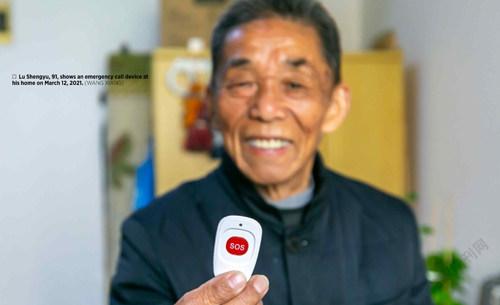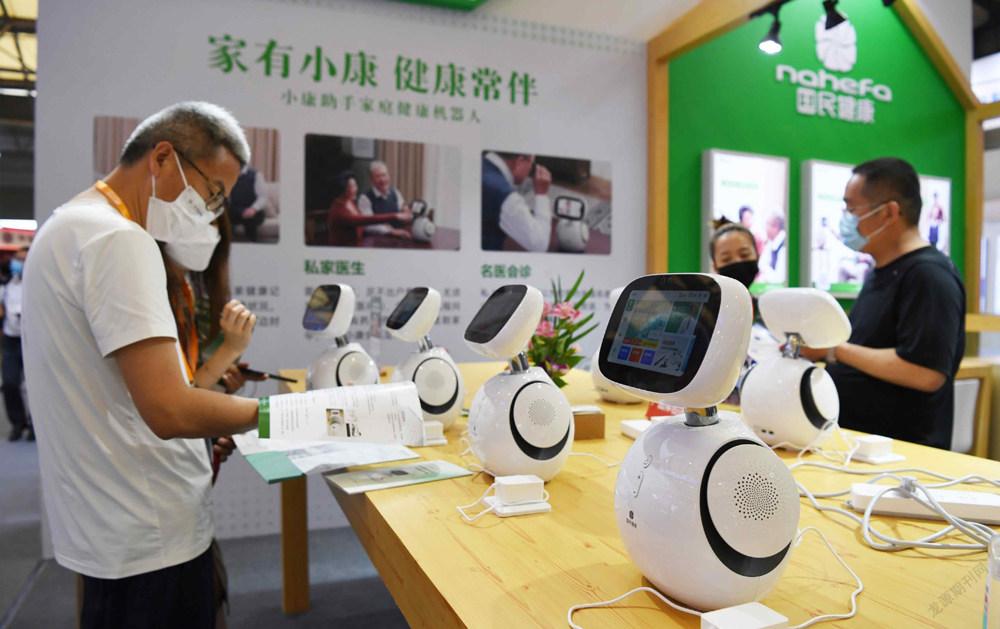Shanghai: Aging in the Digital Age
2022-04-20ZhangYanWuJiayi
Zhang Yan Wu Jiayi


At 87, Mr. Yu submitted a smart home upgrade application to Shanghai’s municipal service platform for senior citizens in late 2021 with assistance from his community in Jing’an District. After receiving his application, Shanghai Fu Shou Kang In-home Senior Care Service dispatched a doorstep examination and evaluation of Yu’s physical condition and home environment based on which they designed a tailored smart home renovation plan. The octogenarian now appreciates the convenience of operating his bedroom lights, curtains, and electric drying rack with just a tap on his smartphone or the sound of his voice. A railed bed and a lightweight wheelchair were also installed at his home, making daily care easier for his children.
Shanghai’s municipal service platform for the elderly is an online platform established by the Shanghai Civil Affairs Bureau to collect information and resources used by service providers, senior citizens and government authorities and provide efficient matchmaking services between the parties.
Age-friendly Services
Shanghai is among the first aging cities in China, and its proportion of older residents continues to rise. By 2025, the metropolis is expected to host nearly 6 million residents over age 60 including 860,000 seniors over 80. To address the daunting challenges of caring for the elderly, the Shanghai Civil Affairs Bureau issued a plan on advancing senior care during the 14th Five-year Plan (2021-2025) period last September, requiring accelerated efforts to improve senior care services through digital transformation.
Launched in 2019, the municipal senior care service platform is senior-friendly in both website and app design, featuring larger fonts and bright colors. An “I want agefriendly home improvements” button dominates the web page. Families with needs for intelligent home furnishings and health-monitoring services can enjoy a renovation subsidy according to their actual conditions from the civil affairs authority by filling out an application. Seniors can also apply for “intelligent companion” service or a nursing home through the platform. The “intelligent companion” allows applicants to play, relax, and learn things on their TV or tablets, while nursing home admission remains a tough problem to tackle. Among the major factors impeding the expansion of inclusive elderly care services in China is a dilemma between insufficient beds at more affordable nursing homes and a high vacancy rate of high-end facilities. By the end of 2021, Shanghai had completed rating 274 senior care institutions, and further measures will be taken to monitor the quality of senior care institutions to ensure the welfare of the residents.
Apart from developing communitybased nursing homes, the municipal government began exploring in-home senior care services in 2019. In the pilot program, eligible families can receive nursing care from professional caregivers alongside big datapowered health monitoring, medicalconsultation, and other services without leaving home. Mr. Yu is among the beneficiaries of the program.
Statistics from the Shanghai Civil Affairs Bureau show that in 2021, alongside 6,868 retrofitted homes, more than 1,000 nursing care beds were installed as an in-home senior care aide.
The “Senior Care Consultant” and “Senior Care Map” sections of the municipal service platform for elderly care provide information on available professional nursing facilities and updated policies, new products, and the latest trends in Shanghai’s senior care industry.
The platform is more than a search engine for senior care information—it sets the standards for professionals and agencies in the industry.
Smart Senior Care
In winter months when suddendrops in temperature can easily induce age-related chronic conditions such as hypertension, many seniors in Gaojing Town of Shanghai’s Baoshan District head to the same destination after morning exercises: Smart Health Homes.
“Nice to see you again, Mr. Chen!” Chen Shenglu, in his 70s, is warmly greeted as he arrives in a Smart Health Home with his cane.
Chen appears healthier than most of his contemporaries, making him the envy of many. However, after 20 years of battling diabetes and recent leg surgery, the old man fears that “bombs hidden in his body” couldexplode at any moment. That’s why, once in a while, he visits the Smart Health Home to measure his height, weight, and blood pressure using selfservice devices. Other indicators such as fat, ECG, blood sugar, uric acid, and total cholesterol are also recorded as references to generate detailed health advice. Abnormal data would trigger a recommendation to seek further examination at hospital.
Another place Mr. Chen frequents is a self-help physical fitness test area. He has a specific reason: Some of his peers had suffered from “sudden lack of hand strength,” which they shrugged off as normal decline in physiological function, before being struck by serious illness. Chen regularly visits the facility for real-time monitoring of his grip strength, lung capacity, and other physical indicators of potential health disorders or diseases so they can be detected early enough for treatment.
In 2021, the Shanghai government opened 40 gyms for the elderly across the city to provide “one-stop” fitness services for senior citizens.
The gyms represent a typicalapplication scenario for Shanghai smart senior care service. To provide more diversified and personalized smart senior care products and services, the municipal government of Shanghai regularly updates the list of possible application scenarios, develops and improves the standards of smart senior care products and services, and encourages the development of relevant smart products, services, and platforms.
In May 2020, the Shanghai Civil Affairs Bureau joined the Shanghai Municipal Commission of Economy and Informatization to release the first group of 12 application scenarios related to smart elderly care services covering four categories: safety protection, nursing care, health promotion, and emotional support. The second group of eight scenarios was announced in June 2021. By illustrating specific scenarios, the government hopes to inspire enterprises and investors to develop smart elderly care solutions in different categories while providing governmental support for related products and services.
After the scenarios were made public, the Shanghai Civil Affairs Bureau began soliciting smart aging application scenario cases from the public. Best products and practices were selected through examination and evaluation.
Shanghai Solutions
“Smart aging” has become a buzzword these days with the rise of big data, cloud computing, and other IT technologies. Although the first national pilot cities (districts) for comprehensive reform of the elderly service industry have been exploring smart aging in urban areas in recent years, no “standard solutions” have yet emerged.
According to the Opinions of the General Office of the State Council on Advancing the Development of Elderly Care Services, high-quality development of elderly care industry requires accelerating integration of the internet with elderly care services. The document urged efforts to promote smart elderly care services, expand application of information technology in senior care, and build anational senior service management information system that combines information about household registration, medical care, social insurance, and social assistance among others.
Smart senior care is a systemic, intelligent development of the industry aimed at meeting seniors’ needs in nursing, health management, safety and security, emergency relief, entertainment, and learning through tech-based products and services. Its development is facing challenges such as coordinating resources, stimulating supply, and satisfying demand.
From senior care products to agefriendly upgrades, and from scenariobased classification to industry information integration, Shanghai is blazing a unique trail for smart senior care by using platforms to bridge all sectors. The city’s 14th FiveYear Plan for the development of senior care set goals of completing senior-friendly upgrades of all mobile internet applications for public service, establishing 100 new gyms for seniors, and wiring 100 nursing homes with web-based services by 2025. Meanwhile, the city’s “all in one” online government service platform and municipal elderly service platform will function to optimize business processes and facilitate development of senior-friendly services.
Shanghai’s innovative attempts towards smart senior care have gone even further. The city’s 14th Five-Year Plan for the development of elderly care also proposed construction of a smart senior care service and management platform covering the entire Yangtze River Delta. It called for joint efforts between Shanghai Municipality and the three nearby provinces of Jiangsu, Zhejiang and Anhui to open information sharing channels on their respective elderly service platforms and eventually establish a pilot elderly care platform serving all citizens in the Yangtze River Delta by 2022. Shanghai is poised to make waves in senior care after some phenomenal first steps.
杂志排行
中国东盟报道的其它文章
- Mainland Medical Experts Continue Inspection of Hong Kong’s Anti-COVID Work
- Lao Leader Speaks Highly of China-Laos Railway
- Chinese Foreign Minister Holds Discussion with Singaporean Counterpart
- Chinese-aided National Road Inaugurated in NE Cambodia
- Thai Health Authorities Approve Sinovac, Sinopharm Vaccines for Use in Children
- VOICES
